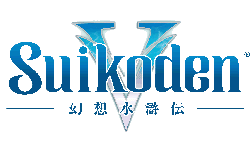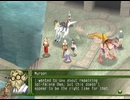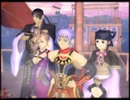|
|

|
BATTLE SYSTEM
|

|
INTERACTION
|

|
ORIGINALITY
|

|
STORY
|

|
MUSIC & SOUND
|

|
VISUALS
|

|
CHALLENGE
|
Average
|
COMPLETION TIME
|
50-70 Hours
|
|
OVERALL
4.0/5
|
Rating definitions
|
|
|
The Queendom of Falena is a lush land full of thick forests, grassy plains, and comforting warmth, as the nation is nurtured by the long Feitas River, which snakes its way throughout the queendom, and the power of the Sun Rune. Into this bountiful land, with all of its amenities, is born the Prince, a young man seemingly destined to live an easy life of few hardships -- it is a queendom after all, and so the young man is barred from inheriting the throne and either dealing with a fractious, manipulative Senate or facing the constant threat of foreign invasion from Falena's neighbors.
Of course, this being a Suikoden game, the prince has quite another thing coming his way. These are, after all, the sort of games that deal with the outbreak of war and its tragic results, political struggles, cultural diversity and the clash of ideals, unassuming individuals being thrust into positions of leadership, and, on a more personal level, the feelings and consequences of betrayal, loss, sacrifice, and maturation.
At the very least, those are the narrative strands that the series has always striven to present to the player, and so the best way to judge the story of this particular Suikoden is to evaluate it against those concepts. How well does Suikoden V's narrative deal with those themes in giving the player a compelling and affecting story? Pretty well, in fact, perhaps surprisingly so after the failures of its bland and lackluster predecessor, Suikoden IV. Suikoden V offers the player the chance to experience a strong, memorable story in an interesting land filled with fascinating people, many of whom will take up the Prince's cause. It succeeds in its narrative objectives, and it is well paced so that the player is continually rewarded by sticking with it.
There are two other aspects that have always made the Suikoden storylines interesting beasts. First is the character recruitment, which functions both as a strong gameplay and storyline element. In his quest, the main character is given the ability to recruit 108 Stars of Destiny, or individuals of particular courage and worth. These characters fill many functions in the gameplay -- some run shops in the Prince's castle, some give him new modes of transportation, some cook, some clean, and many fight -- but all of them are, to some extent, part of the story. As such, they require characterization in the form of personalities, backstories, and motivations for joining the fight. It's not easy to offer strong characterization for so many diverse characters, but this is one of the shining points of Suikoden V. The game does a fantastic job of presenting these characters and making them both interesting and extremely likable to the player, and the characterization here is one of the game's strongest points. It's a cast that the player is driven to care about, and it makes for an emotional finale when Suikoden V tells each player what becomes of all 108 characters after the conflict has resolved.
 Something to Gnaw On
Something to Gnaw On
|
|
The villains don't fare quite so well, unfortunately. As any aficionado of RPG stories can attest, compelling enemies are essential for a story to fully succeed. There's a particularly high standard in this series, which has frequently given players richly textured "bad guys" with fascinating stories, enemies who were rarely evil, but simply came from a conflicting perspective. So, series fans, take note: while the cast of villains in Suikoden V stands heads and shoulders above those in the fourth game in the series, they aren't quite as multi-dimensional as those in the first three games. Nevertheless, they still manage to be both often devious and entertaining, and the game does do a good job of laying out their motivations. While they're not the finest the series has to offer, they're still a cut ahead of most of the genre's "destroy-the-world" menaces.
The other interesting element of the Suikoden series' stories is its reliance upon a single expansive world reused through all of the games. Rather than creating a unique world each time around, Suikoden has instead chosen just one world, and each new game reveals a new locale, new cultures, and a new point on the historical timeline. This narrative device has allowed the Suikoden games to skirt many of the tedious cliches present in many RPG worlds, such as single town countries. Ever since the first game, it has been the task of each new Suikoden to effectively expand this world by showing a new event of historical significance and new cultures that allow for a fuller appreciation of the world as a whole. Suikoden V succeeds in this as well. Falena is a fascinating place to visit, with interesting customs and politics, a ton of unique towns to explore, and much more. The developers make full use of the ability to showcase an entire game in a single country, down to the tiniest details like beautiful clothing styles, which are largely consistent throughout the game. The historical stuff is a nice plus, too; part of the fun of the expansive story is in learning the truth about events that happened five to ten years in the past. High marks continue to be earned by this series on world design. Suikoden V also earns praise for, in many subtle cues, tying itself into the framework established by the earlier games in ways sure to make series fans smile. However, since it's done unobtrusively, it won't present a barrier to Suikoden newcomers.
As excellent as the story is in Suikoden V, RPGs are not defined by their stories alone. Thankfully, Suikoden V largely succeeds in other areas as well. Its gameplay is both fun and full of some original ideas while still retaining the core elements that have functioned effectively in past games. The recruitment of 108 characters offers plenty of fun challenges and side quests. While the game could do a better job of offering in-game hints on where some of the more obscure characters are and how to acquire them, it doesn't diminish from the overall fun of hunting these recruitments down.
Once again, Suikoden offers three distinct combat systems: traditional turn-based battles, which are the norm in most RPGs; one-on-one duels; and large-scale military campaigns featuring armies and navies going at it. The turn-based battles don't differ much from the genre standard, though there are a few nice touches. The big one is the Formation system. Throughout the game, the player can learn new formation tactics, which allows for different ways to arrange the six characters in each battle. Sometimes different formations will confer statistical bonuses or penalties, while also allowing the player to customize how many short-range, medium-range, or long-range characters he or she uses. It's a clever system, and it means that much of the strategy in battling won't just be in determining what each character will do in battle, but also how they'll be arranged. Of course, the player that chooses to ignore this system entirely will still be able to get through the game with the standard formation, but the flexibility of the system allows for different play styles to be used. The only failings to this form of combat are that it's not quite as fast as the earliest Suikoden games, and it isn't very visually impressive.
 A Friendly Face Returns
A Friendly Face Returns
|
|
The military campaigns include probably the best so far in the series. In these story-based encounters, the player arranges recruited characters into various units consisting of infantry, cavalry, and archer types -- or, in naval battles, combat ships, ram ships, and archer ships. These units will then be directed by the player across a large map to clash with an opposing, and generally stronger, force, all while moving in real time. There's an easy-to-master rock-paper-scissors relationship between each unit type, so these battles are pretty difficult to lose. The real challenge, and rush, comes from trying to keep an eye on all the units at once since the battle won't wait for the player to decide what to do. Duels are pretty similar, featuring just two characters going at it, with the choice of guarding, attacking, or performing a special move, again laid out in a rock-paper-scissors style. The player wins by anticipating his opponent's action and reacting appropriately. Both duels and military campaigns are fun and serve to offer breaks from the standard mode of combat.
Suikoden V's graphics are passable, but hardly anything unduly impressive for a late-generation title. Character models are just decent, the camera is fairly awkward, and nothing really stands out from a technical perspective. On the other hand, the art direction is very high quality, and so even if cutscenes aren't technically impressive, they're still pleasing to the eye thanks to the excellent artwork. The music is much the same. It is largely formulaic, lacking in the diversity of cultural influences and instrumentation that made the soundtracks of the first two Suikodens such dramatic successes. Nevertheless, while it doesn't break new ground in RPG composition, it's still a pleasant soundtrack that does its job effectively, and there are a number of stand out pieces. Overall, it's above the average without reaching the level of exquisite. The music is supplemented by very good voice acting.
Another flaw in the game is its clunky interface. Menus are not nearly as streamlined as they could -- and, after so many years of traditional RPGs, should -- be. One way this manifests itself is in the game constantly prompting the player to confirm various actions, with the default always being no. This requires far too many button presses for the simplest of actions. Another example would be in the equipment system interface. While it's possible to select an item from inventory and equip it on a character in a particular spot, this is hardly the most efficient method, and it would've been much better for the game to also allow the player to select a particular spot on a character and then just select from the available equipment for that spot. There are interface problems like this throughout, and while none of them would be a big deal individually, as a whole they drag down the experience of the game somewhat.
Despite all of that, though, Suikoden V's advantages are such that the player should find it a lengthy and richly satisfying experience with a compelling story and fun gameplay that mixes the successful old with the clever and well-implemented new. It's an ideal RPG both for series newcomers, who will find little to prevent them from enjoying this undershadowed gem, as well as long-time fans, who will find a game that isn't as good as the benchmark Suikoden II but still surpasses the mixed recent installments.
Review Archives
|









